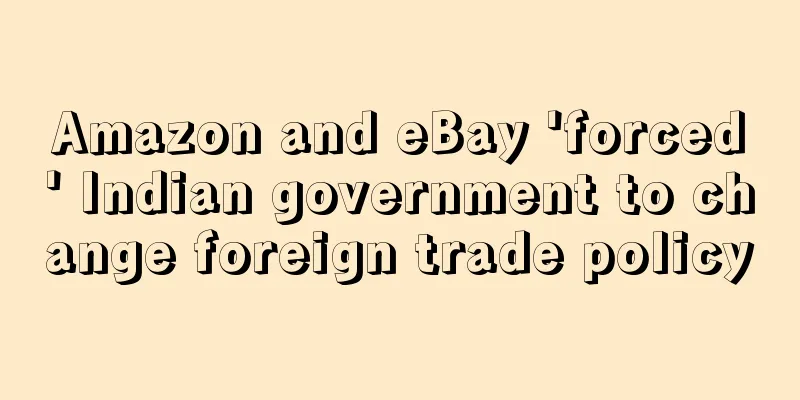Amazon and eBay 'forced' Indian government to change foreign trade policy

|
Global e-commerce giants Amazon and eBay have reportedly made a submission to the Indian government on the revised Foreign Trade Policy ( FTP), which is expected to come into effect on April 1, 2021.
A report issued by Business Standard suggests lowering the entry barriers for small and medium-sized enterprises, which is expected to open up a market worth more than $400 billion. The report also quoted an industry insider, saying that the current export policy largely caters to the traditional offline export sector and the B2B export sector, and also recommends the implementation of end-to-end digital processes and the development of specialized logistics solutions for export-related processes. In addition, the need to simplify compliance and regulatory requirements for long-term development was also raised.
“These suggested provisions should be included in a new chapter on e-commerce exports in the foreign trade policy,” an Indian industry executive said. “This will lay the foundation for a robust e-commerce export policy framework and will help India further expand exports through multiple channels.”
As a country with a large population second only to China, India will have strong purchasing power as it continues to develop. In recent years, many e-commerce giants have indeed set their sights on the Indian market. Although India is still relatively backward compared to some European and American countries in the entire business environment, after all, the Indian government's policies are not very stable, the local infrastructure is relatively weak, and the Indian government is relatively protective of its own companies and is not very friendly to foreign companies, but for major e-commerce giants, India still has a very fatal attraction.
According to eMarketer data, India's e-commerce retail sales will reach US$79.4 billion by 2020, and the number of Indian consumers who use online shopping will increase from 199 million in 2017 to 352 million in 2020. At the same time, India's e-commerce share of total retail sales will increase from 2.5% to 5% in 2020.
However, Amazon's development in India has not been smooth recently. First, the Indian Online Retailers Association claimed that Amazon ignored local Indian regulations and provided preferential treatment to Cloudtail and Appario, in which it indirectly held shares . Therefore, India's antitrust regulator, the Competition Commission of India, is currently investigating Amazon.
eBay first launched its Indian business in 2004 and merged its Indian business with Flipkart in 2017, but the partnership ended in 2018. In 2019, eBay restarted eBay India to focus on B2C e-commerce retail exports. In the same year, eBay also established a strategic partnership with Paytm Mall and acquired a 5.5% stake in the company, strengthening its influence in India. E-commerce platform Amazon Platform eBay Platform |
<<: It’s a great time to go out in spring! Sales of picnic supplies in South Korea surged 237%!
>>: Digital wallets to become most popular payment method in Singapore by 2024
Recommend
Inventory capacity suddenly reduced, slow stocking? Difficult to pick up large and medium-sized products? PostPony can help you easily solve all your worries!
Amazon's restrictions on storage capacity hav...
Some sell wine, some build ships! The diversified layout of big sellers begins
In recent years, more and more cross-border selle...
DTC clothing brand Clovia launches Bra-Bot online sales assistant, which can be reached directly via WhatsApp
According to Indian media reports, Clovia, a well...
Shenzhen Amazon operations recruitment has dropped by 80%! The 2023 job search "map" is here
After experiencing a long period of lows in 2022,...
What is APO/FPO? APO/FPO Review, Features
APO/FPO is also known as the United States Field ...
What is Inatagram? Inatagram Review, Features
Inatagram is a social application running on mobil...
What is Honestbee? Honestbee Review, Features
Honestbee is an online grocery delivery service c...
What is BankClarity? BankClarity Review, Features
BankClarity partners with Moneycorp to offer glob...
More than 10,000 orders were sold in 14 days after it was put on the shelves. This product is a hot seller.
Unlike the late traffic and poor order volume bef...
What is Cyber Intellectual Property? Cyber Intellectual Property Review, Features
Saibei Intellectual Property is an intellectual pr...
Social media e-commerce is flooded with fakes, and it is imperative for platforms to crack down on counterfeiting
The UK Intellectual Property Office (UKIPO) recen...
AliExpress announces the top ten hot-selling products in this summer's promotion: coffee grinders and fascia guns become new overseas business opportunities
What are the latest overseas business opportuniti...
Shenzhen seller was sued for owing 26 million yuan!
Recently, it was revealed that Youkeshu, one of t...
What is Peepul Tree? Peepul Tree Review, Features
Peepul Tree is a platform for handmade works. Pee...
What is insetlan? insetlan Review, Features
insetlan focuses on international household produc...









